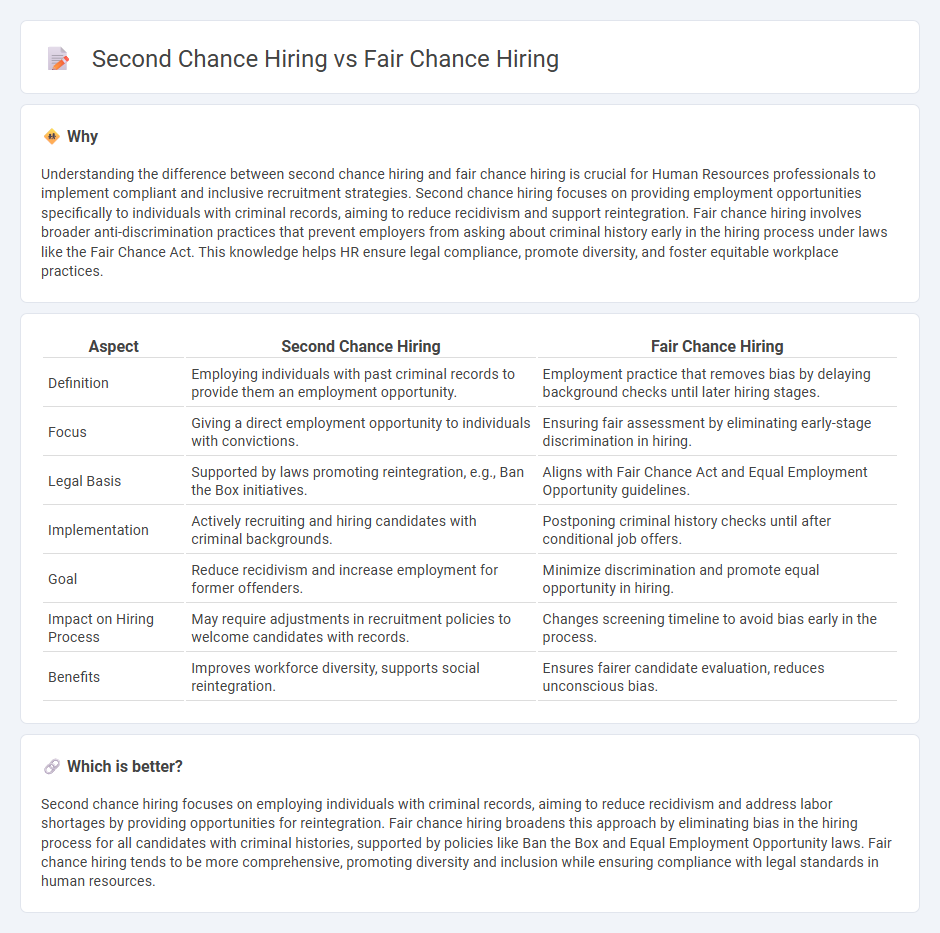
Second chance hiring focuses on providing employment opportunities to individuals with criminal records, aiming to reduce recidivism and support social reintegration. Fair chance hiring emphasizes equitable hiring practices by removing barriers such as criminal history inquiries during initial screening processes to promote diverse and inclusive workplaces. Explore more to understand how these approaches transform human resources and workforce development.
Why it is important
Understanding the difference between second chance hiring and fair chance hiring is crucial for Human Resources professionals to implement compliant and inclusive recruitment strategies. Second chance hiring focuses on providing employment opportunities specifically to individuals with criminal records, aiming to reduce recidivism and support reintegration. Fair chance hiring involves broader anti-discrimination practices that prevent employers from asking about criminal history early in the hiring process under laws like the Fair Chance Act. This knowledge helps HR ensure legal compliance, promote diversity, and foster equitable workplace practices.
Comparison Table
| Aspect | Second Chance Hiring | Fair Chance Hiring |
|---|---|---|
| Definition | Employing individuals with past criminal records to provide them an employment opportunity. | Employment practice that removes bias by delaying background checks until later hiring stages. |
| Focus | Giving a direct employment opportunity to individuals with convictions. | Ensuring fair assessment by eliminating early-stage discrimination in hiring. |
| Legal Basis | Supported by laws promoting reintegration, e.g., Ban the Box initiatives. | Aligns with Fair Chance Act and Equal Employment Opportunity guidelines. |
| Implementation | Actively recruiting and hiring candidates with criminal backgrounds. | Postponing criminal history checks until after conditional job offers. |
| Goal | Reduce recidivism and increase employment for former offenders. | Minimize discrimination and promote equal opportunity in hiring. |
| Impact on Hiring Process | May require adjustments in recruitment policies to welcome candidates with records. | Changes screening timeline to avoid bias early in the process. |
| Benefits | Improves workforce diversity, supports social reintegration. | Ensures fairer candidate evaluation, reduces unconscious bias. |
Which is better?
Second chance hiring focuses on employing individuals with criminal records, aiming to reduce recidivism and address labor shortages by providing opportunities for reintegration. Fair chance hiring broadens this approach by eliminating bias in the hiring process for all candidates with criminal histories, supported by policies like Ban the Box and Equal Employment Opportunity laws. Fair chance hiring tends to be more comprehensive, promoting diversity and inclusion while ensuring compliance with legal standards in human resources.
Connection
Second chance hiring and fair chance hiring both focus on providing employment opportunities to individuals with criminal records, aiming to reduce barriers to workforce reentry. These hiring practices promote equitable treatment by assessing candidates based on qualifications rather than their past convictions, aligning with inclusive Human Resources strategies. Implementing such approaches enhances diversity, reduces recidivism, and supports community reintegration through equitable employment opportunities.
Key Terms
**Fair Chance Hiring:**
Fair Chance Hiring prioritizes giving individuals with criminal records equitable employment opportunities by eliminating biases during the hiring process and adhering to guidelines like the Equal Employment Opportunity Commission's (EEOC) Ban the Box initiative. This approach fosters inclusive workplaces, reduces recidivism, and taps into a diverse talent pool often overlooked due to past convictions. Discover how Fair Chance Hiring transforms recruitment strategies and promotes social justice in the labor market.
Ban the Box
Fair chance hiring and second chance hiring both aim to improve employment opportunities for individuals with criminal records, but fair chance hiring specifically emphasizes removing barriers like the "Ban the Box" initiative, which prohibits employers from inquiring about criminal history on job applications. Ban the Box policies increase the likelihood that applicants are evaluated based on their qualifications rather than their past, promoting equal opportunity and reducing bias during the initial hiring process. Explore how implementing Ban the Box can foster inclusive workplace practices and boost organizational diversity.
Equal Opportunity
Fair chance hiring emphasizes removing barriers for all candidates with criminal records, promoting inclusive recruitment practices aligned with Equal Opportunity principles. Second chance hiring specifically targets individuals who have faced incarceration or legal challenges, aiming to reintegrate them into the workforce and reduce recidivism through employment. Explore how these approaches impact diversity, equity, and inclusion strategies in modern workplaces.
Source and External Links
A Guide to Fair Chance Hiring for Employers [2025] - This webpage provides an overview of fair chance hiring, including its benefits, legal requirements, and how employers can implement compliant policies.
Fair Chance Ordinance for Employers - Los Angeles County - This page explains the Fair Chance Ordinance for Employers in Los Angeles County, which requires equitable protections for individuals with criminal histories.
 dowidth.com
dowidth.com